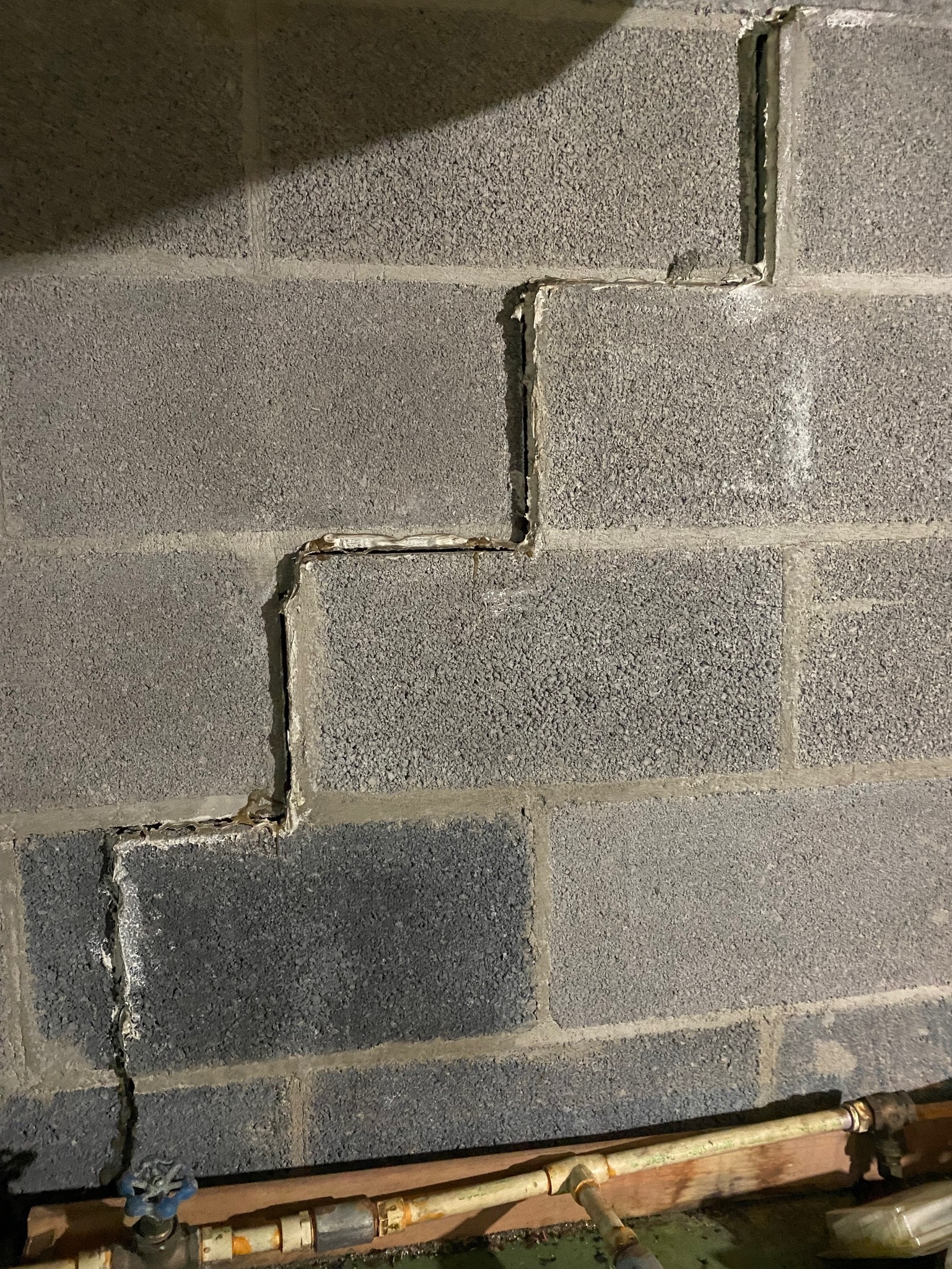
Winter brings freezing temperatures, frozen ground, and a long list of home maintenance concerns — but what if you notice new cracks in your basement walls or sloping floors during the colder months? Should you wait until spring to fix foundation issues, or can they be repaired in the winter?
Contrary to popular belief, foundation repair doesn’t need to wait until the weather warms up. In fact, delaying repairs during winter can lead to worsening structural problems, increased repair costs, and more water intrusion during the spring thaw.
In this article, we’ll explore whether foundation repairs can be completed during winter, what types of repairs are feasible, what limitations exist, and why taking action sooner rather than later is often the best approach.
🔑 Key Takeaways
- Many foundation repairs can be done successfully in winter, depending on the issue and soil conditions.
- Delaying repairs may allow cracks to widen or water damage to worsen.
- Interior solutions like wall reinforcement, crack injection, and drainage installation can proceed in cold weather.
- Exterior work may be limited if the ground is frozen solid, but not impossible.
- Consulting a foundation expert helps determine the safest and most effective plan for your home.
Common Misconceptions About Winter Foundation Repairs
“You can’t do any foundation work in cold weather.”
Not true. While certain tasks — like digging or pouring exterior concrete — may be limited during deep freezes, many foundation repair methods are perfectly viable year-round.
“It’s better to wait until spring.”
Waiting can allow structural issues to progress. Winter freeze-thaw cycles and snowmelt in early spring often exacerbate existing cracks, lead to water intrusion, and make settlement worse.
“Contractors won’t work during the winter.”
Many reputable foundation repair companies operate year-round, using equipment and materials designed to work in colder conditions — especially for interior-based solutions.
Why Winter Foundation Repair May Be Necessary
If you notice new or worsening issues in winter, waiting is rarely the best option. Common cold-season foundation symptoms include:
| Symptom | Why It Happens in Winter |
|---|---|
| New cracks in basement walls | Soil contraction or frost heave stresses the foundation. |
| Increased water seepage | Melting snow finds its way through small cracks. |
| Doors/windows sticking | Uneven movement caused by frost shifting the foundation. |
| Uneven or cold floors | Slab movement from soil changes or loss of insulation. |
These aren’t seasonal quirks — they often indicate underlying foundation movement that needs professional evaluation.
What Repairs Can Be Done in the Winter?
1. Crack Repair and Injection
- Epoxy or polyurethane crack injection can be performed in cold conditions, especially from the interior.
- Repairs help prevent water seepage during snowmelt and spring rains.
- Ideal for vertical or diagonal cracks in basement walls.
2. Carbon Fiber Reinforcement
- High-strength carbon fiber straps can be installed indoors to reinforce bowing walls.
- The materials cure well in heated basements, making winter installation effective and non-invasive.
3. Wall Anchors and Steel I-Beams
- These structural reinforcements are often installed from the inside.
- Anchor installation may involve limited exterior excavation, which is manageable unless the ground is completely frozen.
4. Interior Drainage Systems and Sump Pumps
- Winter is an excellent time to install or upgrade interior waterproofing systems, including:
- French drains
- Drain tile systems
- Sump pump installations with battery backups
- These systems prevent water intrusion during snowmelt and early spring rains.
5. Foundation Inspections and Monitoring
- Professional assessments, laser leveling, and crack mapping can be performed anytime.
- Winter inspections give insight into how your foundation reacts to freeze-thaw cycles.
What May Be Limited by Weather?
Exterior Excavation
- Digging in frozen ground is more difficult, especially during extended cold spells.
- Deep frost may prevent access to certain areas until temperatures rise.
- However, insulated blankets, heated tents, or temporary thawing techniques are sometimes used when urgent repairs are needed.
Concrete Pouring
- Pouring new footings or piers is weather-sensitive.
- Concrete must be kept above freezing during curing, requiring heated enclosures or additives.
Landscaping Restoration
- If a repair involves disturbing your yard, regrading or landscape restoration may be delayed until spring.
Why Fixing Foundation Issues in Winter Is Smart
1. Prevent Further Damage
Cracks tend to expand during freeze-thaw cycles, and water intrusion worsens during spring thaw. Fixing issues now can prevent:
- Mold growth
- Structural shifts
- Interior water damage
2. Faster Scheduling
Winter is typically a less busy season for many contractors, so you may experience shorter wait times and more flexible scheduling.
3. Spring-Ready Protection
Having your foundation stabilized and waterproofed before snowmelt ensures your home is protected during one of the most moisture-heavy seasons of the year.
4. Better Diagnostic Conditions
Winter reveals how your home handles temperature extremes and soil shifts, giving foundation experts a clearer view of stress points and moisture pathways.
Real-Life Example: A Winter Repair Success Story
In January, a homeowner in Salem, VA, noticed a long, horizontal crack in their basement wall that had appeared after a cold snap. Water stains followed, and one basement window frame began pulling away from the wall.
They contacted Seal-Tite Basement Waterproofing for help.
What was found:
- The home’s clay soil had expanded and contracted rapidly due to freeze-thaw cycles.
- Hydrostatic pressure had built up behind the wall.
- The crack indicated active lateral movement and water intrusion.
Solution implemented in winter:
- Installed carbon fiber wall straps on the interior to halt further bowing.
- Injected cracks with polyurethane sealant to stop leaks.
- Extended downspouts and regraded the soil in the spring once the ground thawed.
Because the homeowner acted immediately, major structural damage was avoided — and their basement stayed dry through the spring thaw.
FAQs: Winter Foundation Repairs
Can cracks get worse during the winter?
Yes. Cold weather and freeze-thaw cycles can cause existing cracks to widen, especially if water enters and freezes inside them.
Are repairs more expensive in the winter?
Not necessarily. Some companies offer off-season discounts, and many indoor repairs are priced similarly year-round.
Will foundation repairs last if done in cold weather?
Yes — as long as appropriate materials and methods are used. Reputable contractors know how to work with winter conditions.
What’s the best time to install a sump pump?
Winter is actually ideal, especially before spring rains and snowmelt begin. A functioning sump pump can prevent major water damage in March and April.
Should I wait if the ground is frozen?
Only in specific cases involving deep exterior excavation. Interior and shallow repairs are almost always possible with the right equipment.
Conclusion: Don’t Let Cold Weather Freeze Your Foundation Plans
Foundation damage doesn’t take a break during winter — and neither should your repair plans. Cracks expand, pressure builds, and hidden moisture waits to do damage when the snow melts.
The good news? Most foundation issues can be repaired in the winter, especially those involving interior systems, wall reinforcement, and crack sealing. With today’s materials and methods, there’s no need to wait — and every reason to act before minor issues become major ones.
If you’ve noticed new cracks, bowing walls, or cold-related water seepage, don’t delay. Contact Seal-Tite Basement Waterproofing today for a winter foundation inspection. Our team will assess your situation, explain your options, and restore peace of mind — no matter what the thermometer says.

Seal-tite Basement Waterproofing Co. is a full service basement environment contractor. We carry an A+ Better Business Bureau rating. We repaired over 40,000 homes and structures in Virginia, West Virginia, Tennessee, and North Carolina. We are fully insured and licensed. We have worked in all types of locations, including residential and commercial locations, government agencies, colleges, hospitals, churches, and condo associations.
Seal-tite® offers a lifetime transferable warranty. We carry a Class A Contractor’s License and we are fully insured. Our satisfied customers range from government agencies to businesses, hospitals, colleges, churches, and thousands of homeowners. Your home is probably the single largest investment you will make in your lifetime. Don’t wait, call Seal-tite® to help make your home dry, safe and livable.

